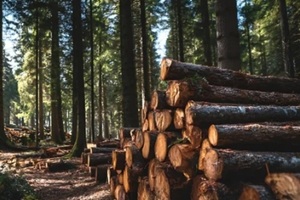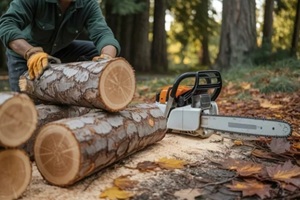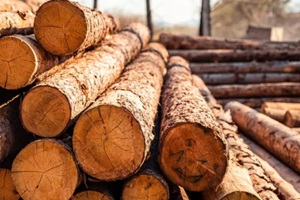
The logging industry operates in one of the most dangerous environments in the U.S. Each day, workers encounter falling trees, heavy machinery, and unpredictable terrain. While safety training and equipment reduce some of the risk, accidents still happen. Logging insurance isn’t just a good idea in this line of work; it can be the difference between recovering after an event or suffering a financial crisis.
Whether you manage a small timber operation or oversee a large-scale logging business, the right insurance coverage can cover your employees, equipment, and livelihood when things go wrong.
Here’s how insurance can be a powerful tool in mitigating risk in the logging industry.
Logging is High Risk
OnlineCollegePlan.com finds states that “135.9 deaths per every 100,000 workers, makes logging the job with the highest fatality rate”, averaging 76 deaths annually.
These incidents often result from a range of hazards, including equipment failure, transportation accidents on or off the job site, struck-by events involving trees or machinery, and slips or falls on uneven terrain. These dangers threaten worker safety, and can also halt operations, damage costly equipment, and trigger liability claims that put the entire business at risk.
How Insurance Can Help Prevent a Financial Disaster
Insurance helps logging businesses recover from the unexpected. It doesn’t eliminate the danger, but it provides a safety net when unfortunate events occur. The right combination of policies can keep a business afloat after an accident, injury, or natural disaster.
Here are some core policies logging companies should consider:
1. General Liability Insurance
This covers third-party bodily injury and property damage. For example, if a falling tree damages neighboring land or injures someone outside your crew, general liability insurance helps cover the costs of legal fees, settlements, and medical bills.
2. Commercial Auto or Commercial Trucking Insurance
Many logging operations rely on heavy-duty vehicles to haul timber. A standard auto policy is not enough. Commercial trucking insurance covers company-owned vehicles used for transporting logs, equipment, or workers. It may also include coverage for vehicle damage, theft, or injuries from auto accidents.
Some policies even protect against lost income due to vehicle downtime, an important benefit in time-sensitive operations.
Learn more about what qualifies as a commercial vehicle from the Federal Motor Carrier Safety Administration.
3. Workers’ Compensation Insurance

In Virginia, workers’ compensation is required for any business with more than two employees. This coverage pays for medical care and lost wages if an employee gets injured on the job.
In an industry like logging, where physical injury is common, workers’ compensation isn’t just a compliance issue; it’s a business necessity.
4. Inland Marine Insurance
Despite the name, this policy doesn’t relate to boats. It covers equipment and tools while they are in transit or temporarily offsite. Logging requires moving gear across rough terrain or long distances, which increases the risk of loss or damage. Inland marine insurance protects chainsaws, skidders, trailers, and other mobile assets.
5. Property Insurance
Property insurance includes your office, workshop, storage facilities, and equipment against events such as fire, vandalism, or severe weather. With many logging businesses located in rural or wooded areas, the threat of wildfire is especially relevant.
The U.S. Forest Service tracks wildfire activity and offers prevention resources to help businesses stay informed.
6. Business Interruption Insurance
If an accident or disaster forces your business to pause operations, this coverage can reimburse lost income and help pay ongoing expenses such as rent or payroll.
Common Insurance Gaps in the Logging Industry
Many logging business owners assume that one or two policies will cover every situation. In reality, gaps can leave a business exposed. Some common issues include:
- Relying on personal auto insurance for commercial trucks
- Underinsuring equipment that has appreciated in value
- Overlooking inland marine coverage for tools in transit
- Failing to adjust policies after purchasing new vehicles or expanding operations
Working with a local insurance professional specializing in the logging industry helps prevent these problems. A knowledgeable agent can assess your full risk exposure and offer guidance on what protections are genuinely needed.
Why Local Expertise Matters
Logging is not a one-size-fits-all business. Terrain, haul distances, seasonal conditions, and crew sizes all impact the type of coverage you may need. Working with an insurance provider that understands local regulations and regional challenges, such as those specific to Virginia, makes a significant difference.
For example, businesses operating in mountainous terrain may need higher coverage limits for equipment damage or towing services. Companies that haul timber long distances may encounter stricter vehicle regulations or additional liability exposure.
An experienced local agency can help identify and close these gaps before they become costly.
Partner With Burton & Company for Reliable Logging Insurance

Burton & Company has spent over a century helping businesses in Virginia protect what matters most. We don’t offer cookie-cutter policies. Our team works closely with logging professionals to build customized coverage based on real needs, not guesswork.
We’ll walk you through your options and help you secure the right combination of insurance policies to protect your equipment, employees, and bottom line. From commercial trucking insurance to workers’ compensation and more, we’re here to help your business weather any storm.
Contact Burton & Company online or call (888) 652-1325 to talk with a knowledgeable agent about your logging business insurance needs.

